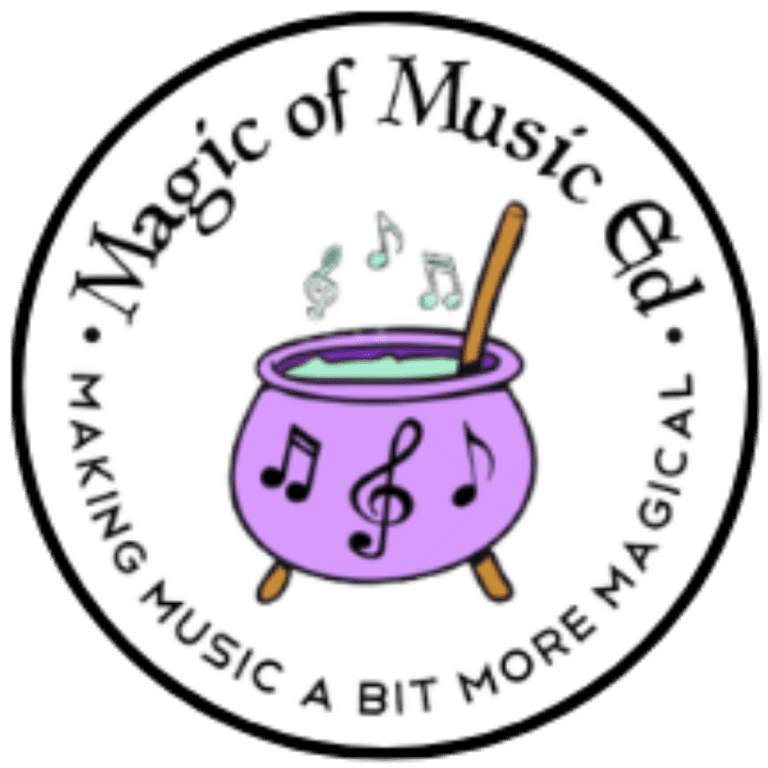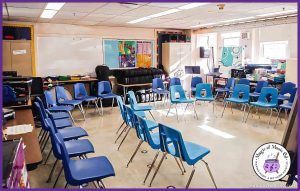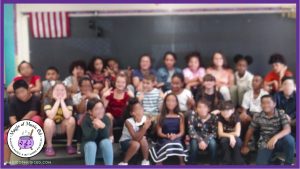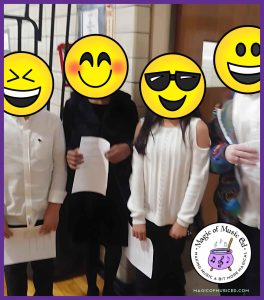It’s 9:45 AM. You’re arranging chairs in the music room for another elementary chorus rehearsal, wondering if all of your students will show up. As you set up the piano, you can’t help but think about the neighboring school’s thriving chorus program with 80+ students. What’s their secret? Having grown two elementary chorus programs from barely-there to bursting-at-the-seams, I can tell you it’s not magic—it’s method, and I’m excited to share what worked for me.
Building Your Elementary Chorus from the Ground Up
Let’s start with recruitment, your foundation of a strong elementary chorus program. Building excitement for chorus starts long before formal recruitment begins. Here are some of my most successful strategies:
- Invite younger students to attend chorus concerts throughout the year
- Talk about your own chorus experience. Consider sharing photos or videos from your first performance!
- Set clear expectations about rehearsals, concerts, and behavior before students sign-up
- Offer a two-week, no-pressure trial period for interested students
I’ve found that inviting younger grade levels to attend chorus concerts has been particularly effective in generating early interest. When younger children are able to see their older peers perform, they often experience something powerful. Something magical happens. Moments of wonder turn into sparks of inspiration, and the seeds for future participation are planted.
It’s interesting to note that sharing your own chorus journey can also create a strong personal connection with your students. Allowing students to see their music teacher as a young beginner can make joining a chorus feel easier. Telling your story can help students understand that everyone starts somewhere—even those who are nervous or unsure.
The Story of a Student Who Found His Voice
When you’re working to build a strong elementary chorus program, it’s easy to get caught up in the numbers. But sometimes it takes just one student to remind us of what really matters. I’ll never forget a student in my fourth year of teaching who completely transformed how I think about chorus.
After our first rehearsal, a fifth-grade student approached me, indicating that he was ready to quit. Why? Because his voice was much deeper than his friends’, and he felt out of place. “That,” I told him, “is because you’re a bass. It’s a special and rare type of voice, and it makes you unique. Your voice is exactly what we need in this group.” I showed him some videos of Avi Kaplan and Geoff Castellucci, two incredible bass singers, and sent him on his way.
Not only did he stay in chorus, but he became one of the most passionate singers I’ve ever taught. He continued singing through middle school, becoming a soloist. He even started writing his own songs. This experience taught me something crucial: every student has untapped potential, even if they don’t see it yet. As music teachers, our true role is to help our students discover that potential, and find their true voice.
Selecting Repertoire That Makes Your Elementary Chorus Thrive
The music you choose for your elementary chorus does more than fill your concert program, it shapes every aspect of your students’ choral experience. Strong repertoire choices can inspire dedication, build confidence, and create those magical moments that keep students coming back rehearsal after rehearsal.
Essential Elements for Your Concert Program:
- Mix of unison and harmony pieces (partner songs and canons are great starting points)
- Various genres and time periods
- One “fun song” that students instantly connect with
- A piece that introduces a new skill (harmonizing, a cappella, movement)
- Solo opportunities to keep advanced singers engaged
Looking for specific repertoire ideas? Check out my post “10 Unique Themes for School Concerts” for songs that work well for specific concert themes.
Using Technology to Support Your Elementary Chorus
Google Classroom has become one of my most valuable tools for maintaining student engagement between rehearsals. As elementary music teachers, we often face unique challenges in staying connected with our students. Unlike classroom teachers who see their students daily, we may only work with our chorus once a week, and we’re also often scheduled across multiple school buildings. This limited face-to-face time can make it difficult to keep students engaged and informed about chorus activities and expectations.
How to Use Google Classroom for Elementary Chorus:
- Share practice tracks, sheet music, and lyrics for practicing at home
- Post important announcements about upcoming rehearsals and concerts
- Share music-related memes and jokes (yes, even the cringe-worthy ones—students love them!)
 Building Long-Term Success in Your Elementary Chorus Program
Building Long-Term Success in Your Elementary Chorus Program
When students join chorus, they will receive a contract that outlines the commitment policy. In my elementary chorus programs, students were given a grace period to experience chorus and decide if it’s right for them. Once this grace period ends, the contract requires them to remain active participants in chorus until after the concert performance.
After each concert, I open a one-week add/drop period that serves two purposes:
- To welcome new singers who were inspired by the concert
- To provide a natural transition point for students who truly want to leave
What makes this timing so effective? After experiencing the thrill and success of a concert, many students who were thinking about quitting, change their minds. There’s something about the energy of performance that reignites their enthusiasm for chorus.
Creating Community Support for Your Elementary Chorus
Your community can become your biggest asset in growing your chorus program. Here are some proven strategies I’ve used to build strong community connections through our concert performances and beyond:
During Concerts
- Share insights between pieces about the vocal skills students are developing
- Recognize every chorus member in the printed program (I’ve squeezed 85 names onto a program in 8.5-point font—it makes students feel valued!)
- Invite advanced students to write program notes that provide context about the pieces being performed
- End with an engaging finale that involves the audience
Want to create an unforgettable moment that brings your whole school community together in song? I stumbled across this amazing Christmas medley from Music K-8 that’s perfect for getting your entire audience singing along. It combines four beloved holiday tunes that everyone knows: “Deck the Halls,” “Up On A Housetop,” “Jingle Bells,” and “We Wish You A Merry Christmas.” It’s an easy, unison medley your students can learn quickly. Your audience will be excited to join in on the fun too!
Here’s what makes this medley work so beautifully as a grand finale: I print a QR code onto the concert program that leads to the lyrics, so families can easily follow along. When everyone comes together to sing these holiday favorites it transforms the concert into a community celebration of music. Plus, the arrangement includes optional band parts, so you can invite your instrumental colleagues to join in and make the experience even more special. Here’s the link to the QR code generator I use for my concert programs.
While creating these special concert moments is powerful, maintaining community support throughout the year is just as important. Here are strategies I use to keep our chorus visible and valued in the school community all year long.
Year-Round Community Engagement
- Send monthly newsletters highlighting chorus achievements
- Invite middle school and high school chorus students to visit and inspire your young singers
- Create opportunities for informal performances within the school
By consistently engaging the community and helping them understand the value of the elementary chorus program, you’ll nurture a support system that helps your program thrive and grow organically through community support.
Final Thoughts
The most successful elementary chorus programs grow from genuine connections, consistent care, and an unwavering belief in students’ musical potential. When you focus on nurturing each singer and creating a true sense of belonging, you build the foundation for a program that will naturally attract more students who want to be part of that special community.





Thankyou Thankyou Thankyou 💓
Oh, you are most welcome! I hope it helps you! Take care 💜